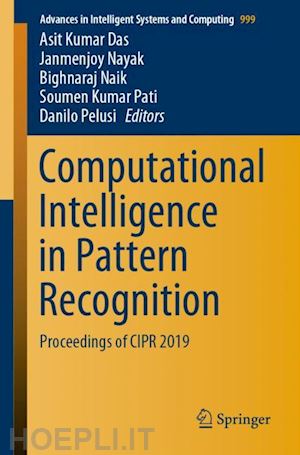
Questo prodotto usufruisce delle SPEDIZIONI GRATIS
selezionando l'opzione Corriere Veloce in fase di ordine.
Pagabile anche con Carta della cultura giovani e del merito, 18App Bonus Cultura e Carta del Docente
This book presents practical development experiences in different areas of data analysis and pattern recognition, focusing on soft computing technologies, clustering and classification algorithms, rough set and fuzzy set theory, evolutionary computations, neural science and neural network systems, image processing, combinatorial pattern matching, social network analysis, audio and video data analysis, data mining in dynamic environments, bioinformatics, hybrid computing, big data analytics and deep learning. It also provides innovative solutions to the challenges in these areas and discusses recent developments.
Feature Selection using NSGA-II for Event Extraction on Genetic and Molecular Mechanisms Involved in Plant Seed Development.- An Improved Data Hiding Scheme through Image Interpolation.- Generalization Of Multi-bit Encoding Function based Data Hiding Scheme.- A Study on Reversible Image Watermarking Using Xilinx System Generator.- Statistical Analysis of the UNSW-NB15 Dataset for Intrusion Detection.- Singer Identification using MFCC and CRP features with Support Vector Machines.- Numerical Integration based Contrast Enhancement using Simpson’s Method.- Empirical Analysis of Proximity Measures in Machine Learning.- Music Tagging and Similarity Analysis for Recommendation System.- Elastic Window for Multiple Face Detection and Tracking from Video.- Efficient Energy Management in Microgrids using Flower Pollination Algorithm.- Automatic Multilingual System from Speech.
Asit Kumar Das is currently a Professor at the Department of Computer Science and Technology, Indian Institute of Engineering Science and Technology, Shibpur, India. His primary research interests are in the areas of data mining, bioinformatics, evolutionary algorithms, audio and video data analysis, text mining and social networks. He has published more than 50 research articles in respected peer-reviewed journals.
Janmenjoy Nayak is working as an Associate Professor at Sri Sivani College of Engineering, Srikakulam, India. He has published more than 50 research papers in various respected peer-reviewed journals and international conference proceedings, as well as a number of book chapters. He has received several awards, such as an INSPIRE Fellowship from DST, Govt. of India, and best researcher award by JNTU, Kakinada, AP. His areas of interest include data mining, nature-inspired algorithms and soft computing.
Bighnaraj Naik is an Assistant Professor at the Department of Computer Applications, VSSUT, Burla, Odisha, India. He has published more than 50 research papers in various respected peer- reviewed journals, referred journals and international conference proceedings, and has reviewed a number of books. He has over nine years of teaching experience in the field of computer science and information technology. His interests include data mining and soft computing.
Soumen Kumar Pati is currently an Associate Professor at the Department of Bio-Informatics, Maulana Abul Kalam Azad University of Technology, West Bengal, India. Dr. Pati received his Ph.D. degree in Engineering from the Department of Computer Science and Technology, Indian Institute of Engineering Science and Technology, Shibpur. His primary research interests are in the areas of data mining, artificial intelligence, soft computing, pattern recognition, social network, network security, machine learning, and he has published numerous articles in these fields.
Danilo Pelusi is an Associate Professor at the Faculty of Communication Sciences, University of Teramo. Associate Editor of IEEE Transactions on Emerging Topics in Computational Intelligence, IEEE Access and guest editor for Elsevier, Springer and Inderscience journals, he served as program member of many conferences and as editorial board member of many journals. His research interests include Fuzzy Logic, Neural Networks, Information Theory and Evolutionary Algorithms.











Il sito utilizza cookie ed altri strumenti di tracciamento che raccolgono informazioni dal dispositivo dell’utente. Oltre ai cookie tecnici ed analitici aggregati, strettamente necessari per il funzionamento di questo sito web, previo consenso dell’utente possono essere installati cookie di profilazione e marketing e cookie dei social media. Cliccando su “Accetto tutti i cookie” saranno attivate tutte le categorie di cookie. Per accettare solo deterninate categorie di cookie, cliccare invece su “Impostazioni cookie”. Chiudendo il banner o continuando a navigare saranno installati solo cookie tecnici. Per maggiori dettagli, consultare la Cookie Policy.